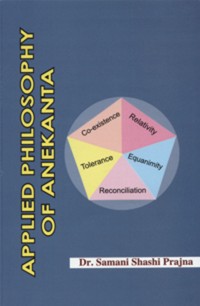The expression syādvāda (conditional dialectics) is composed of two words, viz., 'syad' and 'vāda'. 'Syād' is an indeclinable that appears like a verbal form in the potential mood. It stands for multiplicity, obligation, reasoning etc.[1] But in the present context, it stands for multiplicity or multiple character (anekānta).[2] The term is also used to denote particular space and time.[3] The word syāt in the expression syādvāda, has not been used to mean doubt. It is used to denote multiple characters (anekānta). The implication is that syādvāda is the doctrine of multiple characters. The non-absolutistic estimation is definite in its character and free from all doubts as indicated by the expression 'syād’, which is absolutely free from any kind of association, direct or indirect, with the verbal form 'syād' used in the potential mood of Sanskrit conjugation of verbal root.[4] Thus 'syād' term is the indicator of the relativity of the language.[5]
The word 'syāt' is necessary for the affirmation of the desired attribute by the exclusion of the undesired one. And this is why all the propositions, in order to be precise in meaning, should be accompanied by the use of the word 'syāt'. The proposition without such expressive use of 'syāt' [6] should be understood to have that word implicitly. Thus the word 'syāt' has a double implication:
- Negation without affirmation or affirmation without negation is not possible.
- The generic attribute (continuity or the universal) and the specific attribute (origination, cessation or the particular), both these are relative. We never experience cessation without continuity or the latter without the former.[7]
The nature of a Reality or object is not omnigenous and so it exists in its own nature and does not exist in the nature of alien things,[8] or, to be more exact, a real thing exists in its present modes and does not exist in its modes that have passed away or will come in the future.The cycle of origination and cessation goes on uninterrupted. The mode that arises, is the affirmation, whereas the mode that has passed away or is yet to arise, is the negation of the object. Affirmation and negation are thus simultaneous moments of the Reality.
There is no contradiction between the positum and negatum. This is the implication or pre-supposition of the doctrine of conditional dialectics (syādvāda). The duality of apparently contrary attributes enjoys mutual concomitance. It is on this finding that the doctrine of non-absolutism (anekāntavāda) as a synthesis of infinite number of such dualities is established. The conditional dialectic (syādvāda) is, in essence, the system of propositions expressing such multiple character of the Reality.
Syādvādo niścitārthaḥ apekṣitayāthātathyavastuvādivāt.
 Dr. Samani Shashi Pragya
Dr. Samani Shashi Pragya

